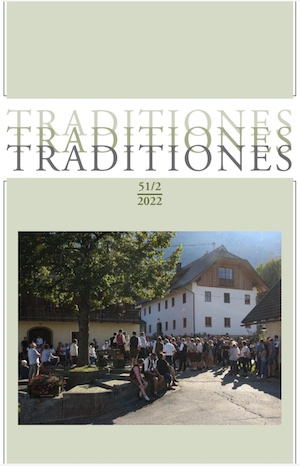Večjezičnost v folklori: O raziskovanju medjezikovnih pesemskih prepletanj (skoraj) stoletje po glonarjevem pozivu
DOI:
https://doi.org/10.3986/Traditio2022510200Ključne besede:
folkloristika, dvojezične pesmi, identiteta, asimilacija, Joža GlonarPovzetek
Izid zadnjega zvezka obsežne znanstvene zbirke Slovenske narodne pesmi, dokončane leta 1923, je pospremil izčrpen kritični uvod, v katerem je novi urednik Joža Glonar poudaril nujnost raziskovanja medjezikovnih pesemskih prepletanj. Raziskave, namenjene preučevanju dvojezičnih pesmi in pesmi, ki so prehajale med narodi, oziroma prispevki s simpozija, ki je to preučevanje postavil v mednarodni okvir, so prinesli ne le vpogled v ta prepletanja, temveč ponujajo tudi odgovor na to, zakaj slovenska folkloristika tem vprašanjem doslej ni mogla slediti.
Prenosi
Literatura
Anderson, Benedict. 2007 (1983). Zamišljene skupnosti: O izvoru in širjenju nacionalizma. Ljubljana: Studia Humanitatis.
Ballinger, Pamela. 2003. Imperial Nostalgia: Mythologizing Habsburg Trieste. Journal of Modern Italian Studies 8 (1): 84–101.
Gellner, Ernest. 2004 (1983). Nations and Nationalism. Oxford: Blackwell.
Glonar, Joža. 1917. 'Regiment po cesti gre . . .' – med Nemci. Ljubljanski zvon 37 (6): 390–392.
Glonar, Joža. 1923. »Predgovor«. V / In Slovenske narodne pesmi IV, ur. / eds. Karel Štrekelj in Joža Glonar, 1–66. Ljubljana: Slovenska matica.
Jöde, Fritz. 1914. Musketier sens lust’ge Brüder: Alte liebe Soldatenlieder. Jena: Eugen Diederichs.
John Eckhard. 2010. Historisch-kritisches Liederlexikon in the Internet. V / In From “Wunderhorn” to the Internet: Perspectives on Conceptions of “Folk Song” and the Editing of Traditional Songs, ur. / eds. John Eckhard in/and Tobias Widmaier, 225–233. Trier: WVT.
Judson, Pieter M. 2018 (2016). Habsburški imperij: Nova zgodovina. Ljubljana: Sophia.
Klobčar, Marija. 2020. The Perception of Bilingual Songs in Slovenia and the Cultural Dimensions of Language Selection. Tautosakos darbai 59: 209–228. http://www.llti.lt/failai/TD59_spaudai_internetine%20versija-193-212.pdf.
Klobčar, Marija. 2022. Intertwining of Languages in Songs and Changes of Identifications in the Gail Valley. Traditiones 51 (2): 91–118. DOI: https://doi.org/10.3986/Traditio2022510205.
Klobčar, Marija, Marjeta Pisk, Marjeta in / and Anja Serec Hodžar, ur. / eds. 2020. Mednarodni simpozij Večjezičnost v folklori: 1.–2. oktober 2020 = International Symposium Multilinguality in Folklore: 1-2 October 2020. Ljubljana: Založba ZRC, ZRC SAZU.
Klobčar, Teja. 2012. Capturing Singing Tradition: The Transcribers of the Committee for the Collection of Slovenian Folk Songs. Jahrbuch des Österreichischen Volksliedwerkes 61: 148–159.
Kovačič, Mojca. 2022. Zakaj, zakoj, warum, or Why?: Multilinguality in Austrian Carinthian Popular Music. Traditiones 51 (2): 119–138. DOI: https://doi.org/10.3986/Traditio2022510206.
Marolt, France. 1935. Slovenske narodoslovne študije: Zv.1: Tri obredja iz Zilje. Ljubljana: Glasbena matica, Folklorni institut.
Pisk, Marjeta. 2022. 'Un bel moretto' – Linguistic Interweavings in Songs from the Primorska Region. Traditiones 51 (2): 55–69. DOI: https://doi.org/10.3986/Traditio2022510203.
Pisk Marjeta in / and Katarina Šrimpf Vendramin. 2021. Večjezične kratke folklorne oblike: Primeri iz Goriških brd. Studia mythologica Slavica 24: 161–178. DOI: https://doi.org/10.3986/SMS20212409.
Ravnik, Mojca. 2022. Singing on the Village Patron's Feast and New Year's Carols: The Case of the Village of Ugovizza / Ukve / Uggowitz in the Val Canale / Kanalska dolina / Kanaltal / Val Cianâl in Italy. Traditiones 51 (2): 71–90. DOI: https://doi.org/10.3986/Traditio2022510204.
Šivic, Urša. 2022. Rituals and Music as Elements in the Use of the Minority Language. Traditiones 51 (2): 139–162. DOI: https://doi.org/10.3986/Traditio2022510207.
Štrekelj, Karel, ur. / ed. 1895–1898. Slovenske narodne pesmi I. Ljubljana: Slovenska matica.
Štrekelj, Karel, ur. / ed. 1900–1903. Slovenske narodne pesmi II. Ljubljana: Slovenska matica.
Štrekelj, Karel, ur. / ed. 1904–1907. Slovenske narodne pesmi III. Ljubljana: Slovenska matica.
Štrekelj, Karel in / and Joža Glonar, ur. / eds. 1908–1923. Slovenske narodne pesmi IV. Ljubljana: Slovenska matica.
Urbancová, Hana. 2022. Multilingual Songbooks in Slovakia in the 19th Century. Traditiones 51 (2): 27–42. DOI: https://doi.org/10.3986/Traditio2022510201.
Youssefzadeh, Ameneh. 2022. Interlinguistic Interwininig in Songs: Dāstān in the Repertoire of Khorasani Bards. Traditiones 51 (2): 43–54. DOI: https://doi.org/10.3986/Traditio2022510202.
Prenosi
Objavljeno
Kako citirati
Številka
Rubrike
Licenca

To delo je licencirano pod Creative Commons Priznanje avtorstva-Nekomercialno-Brez predelav 4.0 mednarodno licenco.
Avtorji jamčijo, da je delo njihova avtorska stvaritev, da v njem niso kršene avtorske pravice tretjih oseb ali kake druge pravice. V primeru zahtevkov tretjih oseb se avtorji zavezujejo, da bodo varovali interese založnika ter da bodo povrnili morebitno škodo.
Podrobneje v rubriki: Prispevki






